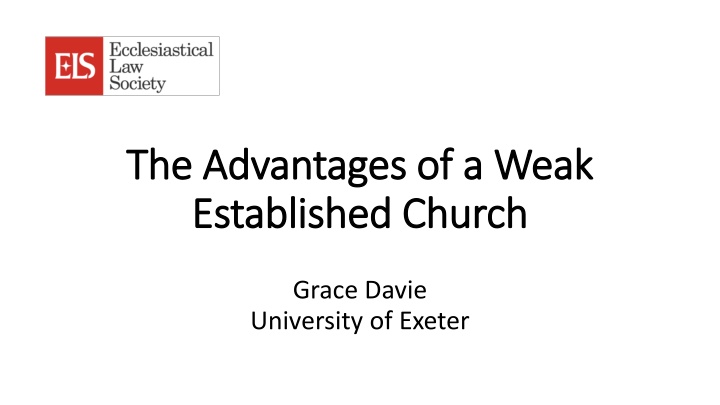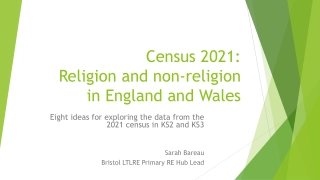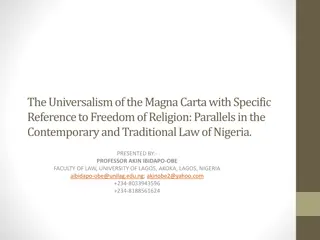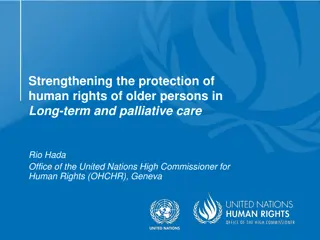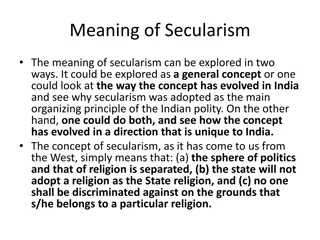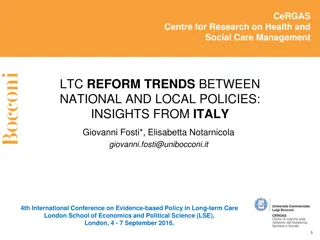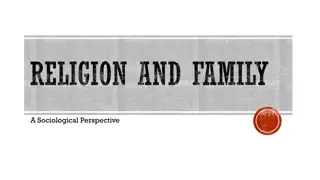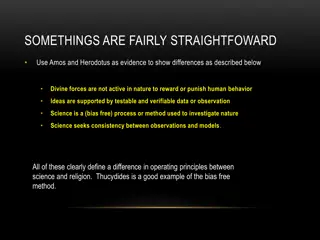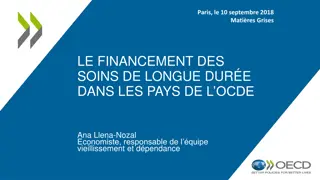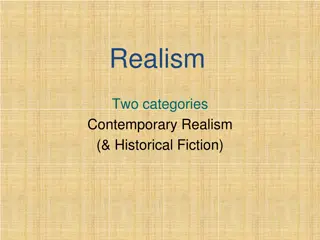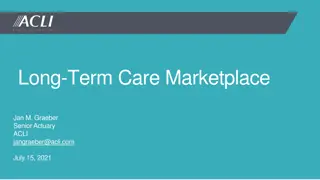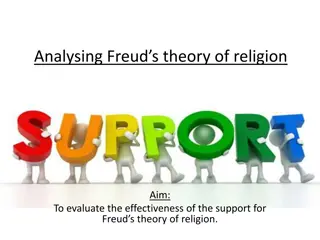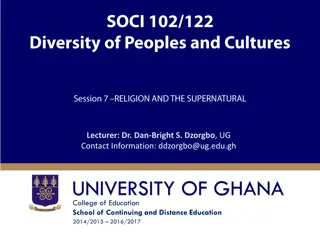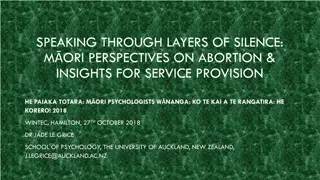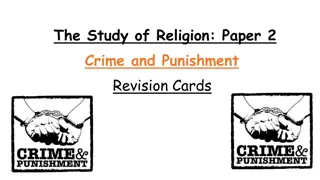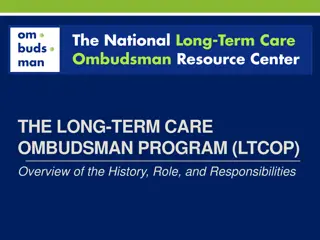Reflections on Religion in Europe: Long-term Perspectives and Contemporary Challenges
Several decades of research on religion in Europe have revealed a distinctive pattern that highlights both the presence and absence of religious influences. The context of cultural institutions, historic churches, shifting societal norms, and increasing diversity poses both opportunities and challenges for established churches in Europe. The continent grapples with issues of secularization, religious literacy, and the evolving role of religion in public discourse, reflecting a complex interplay of factors that shape the religious landscape.
Download Presentation

Please find below an Image/Link to download the presentation.
The content on the website is provided AS IS for your information and personal use only. It may not be sold, licensed, or shared on other websites without obtaining consent from the author.If you encounter any issues during the download, it is possible that the publisher has removed the file from their server.
You are allowed to download the files provided on this website for personal or commercial use, subject to the condition that they are used lawfully. All files are the property of their respective owners.
The content on the website is provided AS IS for your information and personal use only. It may not be sold, licensed, or shared on other websites without obtaining consent from the author.
E N D
Presentation Transcript
The Advantages of a Weak The Advantages of a Weak Established Church Established Church Grace Davie University of Exeter
The argument in outline Long-term thinking about religion in Europe More recent prompts The context in which we find ourselves cultural institutional The consequences for establishment
Religion in Europe Several decades of research and writing in this field An expanding canvas Liverpool (FiTC); Britain; Europe from within; Europe from without; the US; global perspectives A distinctive pattern emerges (see below) what religion in Europe is; what religion in Europe is not paying attention to absence as well as presence
More recent prompts September 2017 Protestantismes, Convictions & Engagements 500 ans de R forme Marie de Paris November 2018 After Brexit: European Unity and the Unity of the European Churches Lambeth Palace
The context in which we find ourselves
The factors to take into account 1. Cultural heritage (time and space) 2. The historic churches (a public utility) 3. A shift from obligation to consumption (a market) 4. New arrivals (increasing diversity) 5. Secular reactions
The implications for Britain Best summarized as a persistent paradox Hence the subtitle of my 2015 book
Specifically A continuing/remorseless process of secularization bringing with it a worrying loss of religious literacy The increasing salience of religion in public as well as private debate, a tendency encouraged by: (a) increasing diversity at home and (b) the ever more obvious presence of religion in the modern world A challenging combination, that occurs right across Europe but is differently engaged in different places
The consequences for establishment The English case
Religious affiliation by year of birth (five year cohorts) Source: British Social Attitudes surveys 1983-2011, pooled (Siobhan McAndrew, British Religion in Numbers)
Revisiting the Church of England Does it still have a role to play in 21stcentury Britain? The difference between a strong and a weak established church The advantages of a weak established church in the management of pluralism in sustaining a constructive conversation about faith at the centre of British (more properly English) society, noting that most religious minorities as opposed to secularists are, very largely, supportive of the Church in question
A distinctive past Four religious cultures in the UK The particular nature of the English Reformation A limited monopoly a state church partially counterbalanced by a substantial bloc of dissent dispersed in the population at large (Martin 1978: 20) The Church of England both Catholic (in structure) and Reformed (in theology) A via media an essentially English church designed to meet the needs of the English people still true?
A comparative perspective What Britain/ England is not? France versus Britain; democracy versus tolerance Strong state churches Worrying tendencies in Poland and Hungary a shift seen even more clearly in the Orthodox world (Russia and Serbia) Conservative ecumenism
Democracy and tolerance 1 France is markedly more democratic than Britain: in terms of its Republican ideals, its elected second chamber, and its developed la cit the absence of religion in the public sphere Britain in contrast has retained its monarchy, its unelected second chamber, and its established church Paradoxically, however, Britain is or has been until very recently noticeably more tolerant than France.
Democracy and tolerance 2 It is, moreover, the apparently undemocratic institutions outlined in the previous slide that are of particular importance in underpinning tolerance in the sense of sustaining a relatively secure place for religious minorities in British society The three institutions will be taken in turn noting however that the arguments are necessarily interlinked
The monarchy The monarch as Supreme Governor of the Church of England but in addition Head of the Commonwealth implications of the former (see below) implications of the latter The Queen (and Prince Charles) know at first hand the very varied nations that make up the Commonwealth and thus the religious cultures from which many of our migrants come hence their well-informed, and highly-respected, support of interfaith activity
The House of Lords Difficult to describe and even harder to justify Heavily weighted in favour of the established church a situation that is difficult to defend given the declining numbers of Anglicans in British (English) society That said, the quality of debate in the House of Lords is frequently higher than it is in the House of Commons a forum in which the voices of religious minorities are present (for example the former Chief Rabbi a highly respected public intellectual)
The Church of England 1 Affirming the advantages of a weak established church The following statement made by the Queen at a multi-faith reception (2012). Speaking of the Church of England, she says: Its role is not to defend Anglicanism to the exclusion of other religions. Instead, the Church has a duty to protect the free practice of all faiths in this country.
The Church of England 2 It certainly provides an identity and spiritual dimension for its own many adherents. But also, gently and assuredly, the Church of England has created an environment for other faith communities and indeed people of no faith to live freely. Woven into the fabric of this country, the Church has helped to build a better society more and more in active co-operation for the common good with those of other faiths. See https://www.royal.uk/queens-speech-lambeth-palace-15-february- 2012
The Church of England 3 How long can this delicate arrangement last? Difficult to say, but in the meantime, be clear that in the continuing debates surrounding establishment, it is seldom the other faith communities that argue for the separation on church and state It is rather a growing, and and at times vocal, secular lobby which argues for the exclusion of faith and faith communities of all kinds from public life as in France
French parallels An aside on President Macron s visit to the the French Bishops Conference (CEF) at the Coll ge des Bernardins in Paris (April 2018) the first time a head of State in France had accepted such an invitation Extreme reactions on both sides More constructive is to grasp the need for the French Catholic Church to discover its rightful place in an increasingly pluralist society no longer hegemonic, it still has much to give in the form of penetrating questions rather than definitive answers faith cannot be totally privatized
The seductions of a strong state church Right wing/ nationalist politicians appropriate Christian values The use of such values to set an agenda, including the exclusion of minorities The state church in question runs the risk of becoming excluding and exclusive The Polish and Hungarian cases; Orthodox examples
Conservative ecumenism A new idea reflecting what are sometimes seen as European culture wars traditionally an American term to describe an American situation In the last decade or so, the culture wars appear to have also taken root in Europe, with Russia becoming a principal champion: arguing for traditional values over and against liberal democracy and human rights - a traditionalist family agenda - hostility to in-migration and minorities/ rising nationalism
A personal view The maintenance of a tolerant and pluralist society is enhanced rather than undermined by an established church an historically privileged but numerically eroded institution is uniquely placed to do this The aftermath of the 2016 referendum a cautionary tale. It is one thing to decide by a narrow majority to leave the EU; it is quite another to find a way forward acceptable to all parties might the same things happen in the case of disestablishment?
Democracy and tolerance 3 I am frequently asked whether I prefer the French or the British case This is the wrong question The current situation in each country derives from a specific and non- transferable history Each society should strive to understand this history better in order to become a more complete (or better) version of itself the place of the established church in this process
